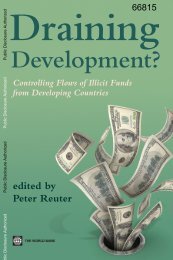rural-urban dynamics_report.pdf - Khazar University
rural-urban dynamics_report.pdf - Khazar University
rural-urban dynamics_report.pdf - Khazar University
You also want an ePaper? Increase the reach of your titles
YUMPU automatically turns print PDFs into web optimized ePapers that Google loves.
GLOBAL MONITORING REPORT 2013 URBANIZATION AND THE MDGS 153<br />
Creditworthiness extends beyond local<br />
governments to their utility companies. In<br />
Kenya, the Water Services Regulatory Board<br />
calculated and published utility shadow<br />
credit ratings for 43 water service providers<br />
in 2011 and found only 13 providers to have<br />
investment grade ratings.<br />
Smaller cities can seek short- and<br />
medium-term loans from higher levels of<br />
government and pool their credit. Thus,<br />
governments of smaller cities can use bond<br />
banks, loan pools, and guarantees to reduce<br />
lenders’ risks. Two common types of municipal<br />
bonds are general obligation bonds, debt<br />
instruments secured by general purpose<br />
municipal revenue such as property taxes,<br />
and revenue bonds, debt instruments secured<br />
by the revenue generated from specific<br />
municipal assets (such as ports, toll roads,<br />
and water and wastewater utilities), with or<br />
without recourse to general revenues. Revenue<br />
bonds are particularly useful in cases<br />
where bond markets are not well developed.<br />
Colombia, India, Malaysia, Romania, the<br />
Russian Federation, the Slovak Republic,<br />
Slovenia, South Africa, and República Bolivariana<br />
de Venezuela provide examples of<br />
countries where cities have raised funds from<br />
municipal bonds.<br />
In the absence of a well-developed bond<br />
market, financial intermediaries in diverse<br />
forms play important roles in mobilizing<br />
resources for <strong>urban</strong> infrastructure financing.<br />
In Colombia, a successful financial intermediary<br />
is FINDETER (Financiadora de<br />
Desarrollo Territorial S.A.), a government<br />
company created to finance regional <strong>urban</strong><br />
infrastructure projects. More than 90 percent<br />
owned by the national government, with<br />
the remainder owned by the regions (departments),<br />
FINDETER provides resources for<br />
financial intermediaries who assign them to<br />
regional authorities. It has received funds<br />
from multilateral banks and has consistently<br />
received high credit ratings (Samad, Lozano-<br />
Gracia, and Panman 2012). Still, none of<br />
these methods can replace a creditworthy<br />
local government.<br />
Coordinate public and private finance<br />
using clear and consistent rules<br />
When city governments have constrained<br />
access to credit, private investors may step<br />
in to fill the gap. There are many types of<br />
partnership structures, with each one transferring<br />
different levels of risk to the private<br />
sector. They include service contracts, management<br />
contracts, leases, and privatization.<br />
Under any of these structures, property rights<br />
must first be clearly defined so that creditors<br />
need not depend on the government’s<br />
promises. Then a PPP, with private sector<br />
selection mechanisms based on the market<br />
and on cost-benefit analyses, can improve<br />
project selection and ensure project sustainability<br />
while adding sources of infrastructure<br />
financing. Nevertheless, PPPs are no<br />
magic bullet: they require commitments to<br />
sustainable cost-covering tariffs or equivalent<br />
tax revenues. They cannot stand in for<br />
good financial management or good project<br />
evaluation. Clear rules must dictate the procedures,<br />
the requirements, the approvals, and<br />
the institutional responsibilities of the entities<br />
involved, and the allocation of risk.<br />
Consider Ghana, where such rules were<br />
not in place. In 2002, the government of<br />
Ghana initiated a process to encourage several<br />
PPPs in the <strong>urban</strong> water sector, but the<br />
partnerships succumbed to lack of transparency<br />
and accusations of corruption in the<br />
selection process. In contrast, Chile put in<br />
place a clear and transparent procurement<br />
process, focusing on public awareness and a<br />
learning-by-doing approach that allowed for<br />
adjustments along the way. This process led<br />
to the award of 21 road projects on a competitive<br />
basis between 1993 and 2001 (Hodge<br />
2006). The bidding started with smaller projects<br />
to test the market while also minimizing<br />
the risk for the private sector. More than 40<br />
Chilean and international companies from 10<br />
countries participated in the bidding through<br />
27 consortia.<br />
To successfully implement PPPs, city leaders<br />
will have to consider strengthening public<br />
sector capacity, laying out the appropriate<br />
legal and sector framework, promoting

















